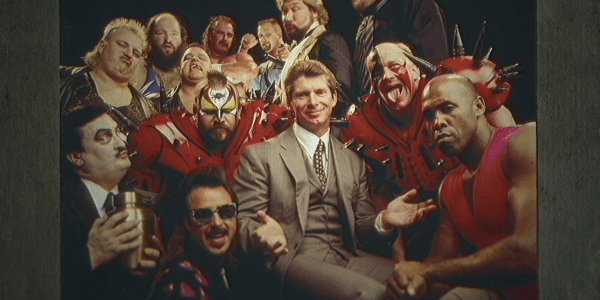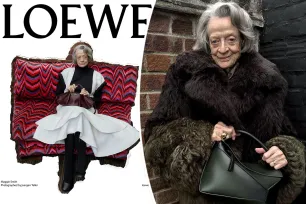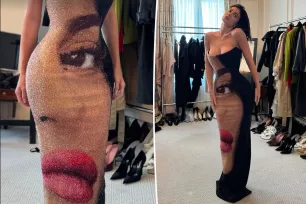The term ‘kayfabe’ is used too infrequently in Mr McMahon, the six-part Netflix documentary series about Vince McMahon, the larger-than-life former head honcho of the WWE. But no other word captures the surreal thrill of watching wrestling more accurately. Broadly speaking, ‘kayfabe’ points to the illusion of reality that professional wrestlers must uphold both inside and outside the ring, to convince intelligent audiences that nothing they’re seeing is fabricated. They probably know that it is — people aren’t fools, they understand that WWE is essentially a violent travelling circus — but nevertheless, shattering this illusion is a cardinal sin.
From Chris Smith, whose filmography is more eclectic than a food court menu — he has worked with everyone from Robert Downey Jr to Nana Patekar — Mr McMahon falls squarely in the category of the shock-docs that have become bread and butter for Netflix. In a stroke of bad luck, mainly from a narrative point-of-view, the show’s subject withdrew his participation immediately after allegations of sexual misconduct were levelled against him some months ago. Because of this, each episode begins with a disclaimer that declares that most of what follows was filmed before these allegations were made, thereby acknowledging that everything might seem a little dated. It does. If there was a ‘kayfabe’ for television shows, this is it.

Also read – Bad Vegan review: Netflix’s latest true crime documentary makes for a tasty but trashy binge
 Vince McMahon surrounded by a troupe of wrestlers in Netflix’s Mr McMahon.
Vince McMahon surrounded by a troupe of wrestlers in Netflix’s Mr McMahon.
Smith can neither ignore the allegations, nor can he rework his entire narrative around them because it’s obvious that he set out to make a different show altogether. It’s not his fault; he couldn’t have known what was around the corner. The most that he could have perhaps done on the edit table was to avoid showing any admiration for McMahon in light of what happened, but he is only moderately successful at this. While the show makes it a point to highlight just how ruthless he was as a businessman, and how despicable he could be as a person, it can’t help but view McMahon with a twinkle in its eye.
Having grown up in an abusive household as a child, McMahon attached himself to his estranged father — the wrestling promoter Vince McMahon Sr — the second he became old enough to escape the grip of his violent step-dad. He took over the business when his father died, and built it into a billion-dollar empire that stands till today. Along the way, McMahon created stars out of folks such as Hulk Hogan, The Undertaker, Triple H, Steve Austin, John Cena, and The Rock — all of them appear in the series — but perhaps his most enduring creation was his own alter ego — ‘Mr McMahon’, a villainous character who, in wrestling parlance, would be described as a ‘heel’.
Cena and Hogan insist that not much separates the ‘real’ McMahon from his on-screen persona. The evil businessman that he played on Monday Night RAW was only a slightly exaggerated version of the actual man – an exacting, dictatorial demon who exploited everyone around him. He’d do anything in order to attract an audience. As the Hall of Famer Tony Atlas says, “He don’t see black, he don’t see white. He only sees green.” The series revisits some of the most controversial moments from WWE history, such as the shocking death of wrestler Owen Hart. He was supposed to float down into the arena from a great height, but something went wrong with the rig, and Hart fell to his death in front of a crowd of thousands. McMahon made the controversial decision to continue the show, with Hart’s blood still splattered on the ring.
This wasn’t, however, the most obnoxious thing that he did during his tenure at the helm of affairs. Described as ‘the PT Barnum of professional wrestling’, McMahon once orchestrated a bout with his own daughter because she refused to allow him to sell tickets to her legitimate wedding. Even if it was fake, the narrative arc culminated with McMahon knocking her senseless in front of a paying audience. But this is mild for a man who once suggested a storyline in which his daughter, Stephanie, becomes impregnated. By him. She appears in the show to reveal that she put her foot down when her dad pitched the idea to her. She can’t even bring herself to reveal what the other one was. This was the ’90s, when the WWE was in its ‘Attitude Era’. This was when school kids would be sent marching to the principal’s office for simply doing the rude Degeneration X gesture; when having WWE trading cards on your person in school was basically the equivalent of a sniffer dog finding drugs in your bags at the Singapore airport.
Also read – The Indrani Mukerjea Story – Buried Truth review: Snarky but not salacious, Netflix’s true crime series examines Sheena Bora case with uncommon sensitivity
 Vince McMahon with Andre the Giant in a still from Netflix’s Mr McMahon.
Vince McMahon with Andre the Giant in a still from Netflix’s Mr McMahon.
Alongside furious journalists, several executives are featured in the series as well, and most of them gaze at their shoelaces while discussing the WWE’s long (and well-documented) history of sexism. Multiple storylines on WWE were devoted to showing women as either sex objects or playthings meant for the pleasure of men. “We abused the hell out of women,” says a remorseless Tony Atlas, describing the first batch of WWE wrestlers as some of the ‘worst people to walk the face of the earth’. He wasn’t talking about their on-screen characters. Is it actually surprising that an organisation with such a depraved past is being indicted for covering up actual sexual abuse, the show asks. Every episode ends with horrific title cards informing the viewer about the hush money that McMahon has handed out to women over the years.
It’s a pity that he declined to be interviewed following the accusations. It suggests that deep down, McMahon is aware that he isn’t bulletproof. Less egotistical men than him have bragged about their innocence to the public after being accused of similar crimes. Of course, he tried to derail the show’s release, and having watched a few episodes, his close associate accuses the filmmakers of presenting a biased view of McMahon. But Mr McMahon plays more like an opinionated Wikipedia article than a piece of narrative entertainment. Fans will be pleased, but outsiders might view the entire thing with a degree of incredulity.
Mr McMahon
Director – Chris Smith
Rating – 2/5
Disclaimer: The copyright of this article belongs to the original author. Reposting this article is solely for the purpose of information dissemination and does not constitute any investment advice. If there is any infringement, please contact us immediately. We will make corrections or deletions as necessary. Thank you.







